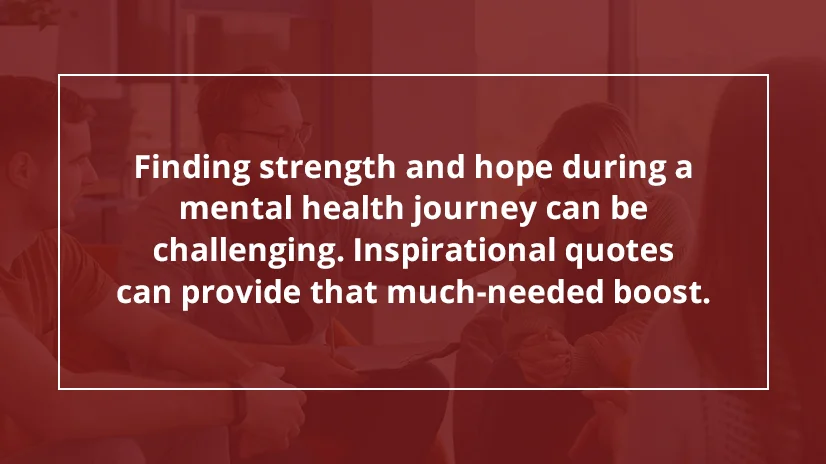
Inspirational Quotes On Mental Health Recovery
Inspirational quotes can offer solace, encouragement, and empowerment to those navigating mental health recovery. These quotes, often born from personal struggles and triumphs, resonate deeply with individuals facing mental health challenges, offering a beacon of hope and reassurance.
They remind us that recovery is not only possible but a courageous path towards reclaiming one’s well-being and inner strength. Whether highlighting resilience, self-compassion, or the transformative power of healing, these quotes serve as reminders of the human spirit’s capacity to overcome adversity and thrive.
Key Takeaways
Mental health recovery is a deeply personal journey that involves overcoming challenges, rebuilding one’s life, and finding a sense of purpose and well-being. Here’s what you’ll learn in this article:
- Inspirational quotes can provide hope and encouragement during the challenging journey of mental health recovery.
- These quotes remind individuals that recovery is possible and that progress, no matter how small, is significant.
- Positive affirmations from inspirational quotes can help reinforce self-worth and resilience in the face of mental health struggles.
In case you and your friend need guidance dealing with mental health conditions, contact Indiana Center for Recovery’s official website or call us at (844) 650-0064 for professional help to live a normal life ahead.

Role Of Inspirational Quotes
Inspirational quotes play a powerful role in our daily lives. They act as a source of motivation, encouragement, hope, positivity, and reinforcement of self-worth and self-love. By reading and reflecting on these quotes, we can gain a new perspective and find the strength to overcome mental health disorders.
Motivation And Encouragement
Inspirational mental health quotes motivate and encourage people to pursue their goals and dreams. They remind us that others have faced similar obstacles in their mental health recovery journey and triumphed. By internalizing these messages, we can find the courage to keep moving forward, even when times are tough. For example, a quote like, “Believe you can, and you’re halfway there,” can push us to take the first step toward positive mental health.
Providing Hope And Positivity
In moments of doubt and despair, inspirational quotes provide a beacon of hope and positivity. They remind us that poor mental health setbacks are temporary and that happier days are ahead. Quotes such as “This too shall pass” offer comfort and reassurance. By focusing on positive thoughts, we can foster a more cheerful outlook on life and attract positive outcomes.
Reinforcing Self-Worth And Self-Love
Inspirational quotes also reinforce self-worth and self-love. They remind us of our inherent value and encourage us to treat ourselves with kindness and respect. A quote like “You are enough just as you are” can boost self-esteem and help us appreciate our unique qualities. By embracing these affirmations, we build a stronger sense of self and a more positive self-image.
Curated Inspirational Quotes For Mental Health Recovery
Finding strength and hope during a mental health journey can be challenging. Inspirational quotes can provide that much-needed boost. For instance, Eleanor Roosevelt said, “You gain strength, courage, and confidence by every experience in which you really stop to look fear in the face.” This reminds us that facing our fears helps us grow stronger.
Another powerful quote by Maya Angelou is, “You may not control all the events that happen to you, but you can decide not to be reduced by them.” These words encourage us to stay resilient despite life’s hardships.
Quotes On Overcoming Challenges
Life is full of challenges, but overcoming them is what shapes us. Nelson Mandela once said, “It always seems impossible until it’s done.” This quote teaches us that the toughest tasks often feel unattainable, but with perseverance, we can achieve them.
Another motivating quote is from Martin Luther King Jr., “The ultimate measure of a man is not where he stands in moments of comfort and convenience, but where he stands at times of challenge and controversy.” This reminds us that true character is revealed in difficult times.
Quotes On Resilience
Resilience is the ability to bounce back from adversity. Helen Keller, who overcame immense challenges, including depression and anxiety, said, “Although the world is full of suffering, it is also full of the overcoming of it.” Her words inspire us to see the possibilities for recovery and growth.
Another Confucius quote states, “Our greatest glory is not in never falling, but in rising every time we fall.” This emphasizes that resilience is about getting back up after we stumble.
Quotes On Self-Compassion And Self-Love
Self-compassion and self-love are essential for good mental health. Buddha once said, “You yourself, as much as anybody in the entire universe, deserve your love and affection.” This quote highlights the importance of treating ourselves with kindness. Another profound quote by Lucille Ball is, “Love yourself first, and everything else falls into line.” These words remind us that self-love and self-care are the foundation for a fulfilling life.
Quotes On Hope And Positivity
Hope and positivity can transform our outlook on life. Anne Frank, despite her circumstances, wrote, “Where there’s hope, there’s life. It fills us with fresh courage and makes us strong again.” Her words remind us that hope gives us the strength to carry on.
Additionally, Christopher Reeve’s quote, “Once you choose hope, anything’s possible,” encourages us to embrace hope as a powerful force for achieving our dreams.
How To Use Inspirational Quotes In Your Recovery Process
Inspirational quotes can be powerful tools in your recovery from bipolar disorder, manic depression, and drug addiction. They offer hope, encouragement, and a new perspective when things get tough. By integrating these quotes into your daily routine, you can keep yourself motivated and focused on your goals.
Daily Affirmations And Mantras
Start your day with a positive mindset by using daily affirmations and mantras. Choose quotes that resonate with you and repeat them every morning. For example, you might say, “I am strong and capable of overcoming any challenge.” This simple practice helps set a positive tone for the day and reminds you of your inner strength.
Place these quotes where you can see them often, like on your bathroom mirror or as your phone’s wallpaper, to reinforce their messages throughout the day.
Incorporating Quotes Into Therapy And Counseling
Inspirational quotes can also be significant in therapy and counseling sessions for mental health problems. Share your favorite quotes with your therapist or counselor. Discuss why these quotes matter to you and how they relate to your recovery process.
Your therapist might use them as conversation starters or as tools to explore your feelings and thoughts. They can help you articulate your goals, reflect on your progress, and identify areas where you need more support. By weaving these quotes into your sessions, you create a bridge between your everyday life and your therapeutic work.
Using Quotes For Journaling And Reflection
Journaling is a valuable practice for self-reflection and growth. Incorporate inspirational and motivational quotes into your journal entries to guide your thoughts about mental and physical health and provide focus. Start by writing down a quote that resonates with you.
Reflect on why it speaks to you and how it relates to your current experiences. Use the quote as a prompt to explore your emotions, challenges, and achievements. This practice not only deepens your understanding of your recovery journey but also helps you stay connected to your goals and motivations.
Creating Your Own Inspirational Quotes
Creating inspirational quotes is a powerful way to address your personal challenges and inspire others. By identifying your triggers, crafting personalized affirmations, and sharing your quotes, you can make a positive impact on yourself and those around you. Start today and watch how your words can transform your mindset and the lives of others.
Identifying Personal Triggers And Challenges
Start by identifying your personal mental illness triggers and challenges. Think about moments when you felt stressed, overwhelmed, or discouraged. What events or thoughts caused those feelings? Understanding these triggers helps you create quotes that address your specific needs. For example, if public speaking makes you anxious, focus on quotes that boost your confidence. By recognizing your challenges, you can craft quotes and stories that offer comfort and motivation during tough times.
Crafting Personalized Affirmations
Now that you know your triggers, it’s time to craft personalized confirmations. Affirmations are positive statements that challenge negative opinions and promote self-belief. Start by using “I am” or “I can” statements.
For instance, if you struggle with self-doubt, you might create an affirmation like, “I am capable and confident.” Make sure your affirmations are realistic and reflect your true potential. Personalize them by including specific qualities or goals you want to achieve. The more personal and meaningful the affirmation, the more powerful it becomes.
Sharing Your Quotes With Others
Once you’ve created your motivational quotes, share them with others. You can post them on social media, share them with friends and in support groups, or even create artwork featuring your quotes. Sharing your positive quotes not only spreads positivity but also helps reinforce your own beliefs.
When others see and appreciate your quotes, it boosts your confidence, reduces stigma and shame, and motivates you to continue creating. Plus, you never know who might need to hear your words of encouragement. By sharing your quotes, you contribute to a supportive and uplifting community.
Frequently Asked Questions (FAQ)
How can inspirational quotes aid in mental health recovery?
Inspirational quotes can aid in mental health recovery by providing motivation, hope, and a positive outlook. They can serve as daily reminders of strength, resilience, and the possibility of change. Reading quotes from Robert Frost, John Green, Robert Louis Stevenson, and Charles Bukowski, who have overcome similar challenges, can foster a sense of connection and encouragement.
Integrating these quotes into a daily routine can help shift negative thinking patterns, boost self-esteem, and reinforce a proactive mindset. Ultimately, they offer brief yet powerful moments of reflection and inspiration that support the recovery journey.
How often should I read or reflect on these quotes for them to be effective?
To make quotes effective, reflect on them daily. Integrate them into your morning routine or evening reflection. Reading them consistently helps internalize their messages and can positively influence your mind. Consider keeping a paper to jot down your thoughts on the best quotes, noting how they resonate with you and impact your daily life.
Consistency is key; daily repetition reinforces their meaning and helps build a habit of mindfulness and inspiration. Adjust the frequency based on how they make you feel and your personal growth goals.
Achieve Mental Wellness With Indiana Center For Recovery
Say goodbye to mental health issues with Indiana Center for Recovery’s comprehensive treatment programs. Whether you prefer the structured environment of residential care or the flexibility of outpatient services, we tailor our approach to fit your needs.
Experience the power of Cognitive Behavioral Therapy (CBT) and eye movement desensitization and reprocessing (EMDR), proven therapies that can lead to lasting healing.
Your path to healing begins here. Reach out to us at (844) 650-0064 now for your mental health needs.



 100% Confidential
100% Confidential
